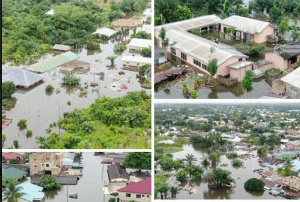Stakeholders are expressing growing concerns about the increasing cases of Female Genital Schistosomiasis (FGS) in communities located near the Volta Basin, particularly those near the Lakeside, after the recent spillage of the Akosombo Dam.
This river-borne tropical disease, commonly referred to as bilharzia, is a neglected tropical disease (NTD) that poses a significant threat to female reproductive health and maternal well-being.
The Director of the Environmental and Sustainable Development Department at the Volta River Authority (VRA), Mr. Ben Sackey, addressed the issue during a symposium in Ho, marking the 2024 World NTDs Awareness Day.
Highlighting the challenges posed by schistosomiasis, he further emphasized its prevalence in over 400 communities across five regions sharing the Volta Basin, a consequence of the dam's construction.
Floods caused by the dam's spillage carry aquatic weeds hosting snails that also carry schisto worms. Mr. Sackey explained, "With the floodwaters was the movement of the water weeds which harbor the schisto snail vector. What it means is that the weeds could now find themselves in communities where hitherto were not there."
Mr. Sackey has mentioned the initiation of a baseline study on the spread of infection after the spillage, in collaboration with the VRA and the University of Health and Allied Sciences.
The affected communities are being provided with sanitary facilities and drinking water, and partnerships are aiding in mass drug administration. There are future projects in the pipeline, which include the dredging of the lower Volta.
During a recent discussion on public health, Professor Morhe, who leads the Obstetrics and Gynecology department at UHAS, drew attention to a troubling issue. He spoke passionately about a waterborne tropical infection that has been ignored for far too long. According to him, this infection poses a significant threat to women's health, and we must take action immediately.
Professor Morhe went on to explain that this infection can cause serious complications in women's reproductive organs. These complications could ultimately lead to infertility, ectopic pregnancies, preterm births, and even increased susceptibility to HIV. It is clear that this issue deserves our attention, and we must act quickly to prevent its spread and protect women's health.
A recent study conducted in eleven communities located in the Volta basin has revealed that 36.21% of 400 surveyed women were found to be affected by a certain disease. In light of this, Prof. Morhe has urged stakeholders to prioritize disease prevention efforts such as putting an end to open defecation and urination, which contribute to the infestation of water bodies.
Dr. Alfred Kwesi Manyeh, who is leading the UHAS-VRA baseline study, has highlighted the fact that the infested river is culturally dependent on local economic activities. He emphasized the need for improved water supply, social mobilization, and stakeholder engagement to address the issue.
The symposium, themed "Addressing the Burden of Schistosomiasis and the Related Conditions in Ghana Towards Achievement of the 2023 Road Map," brought together various stakeholders, including heads of the Volta Regional Health Directorate and health experts.
A route march through the streets of Ho and Hohoe preceded the symposium to raise community awareness about NTDs, with a focus on the dreaded Schistosomiasis.

